Remembering Jean Darsie, who saw dignity of people who live on the streets
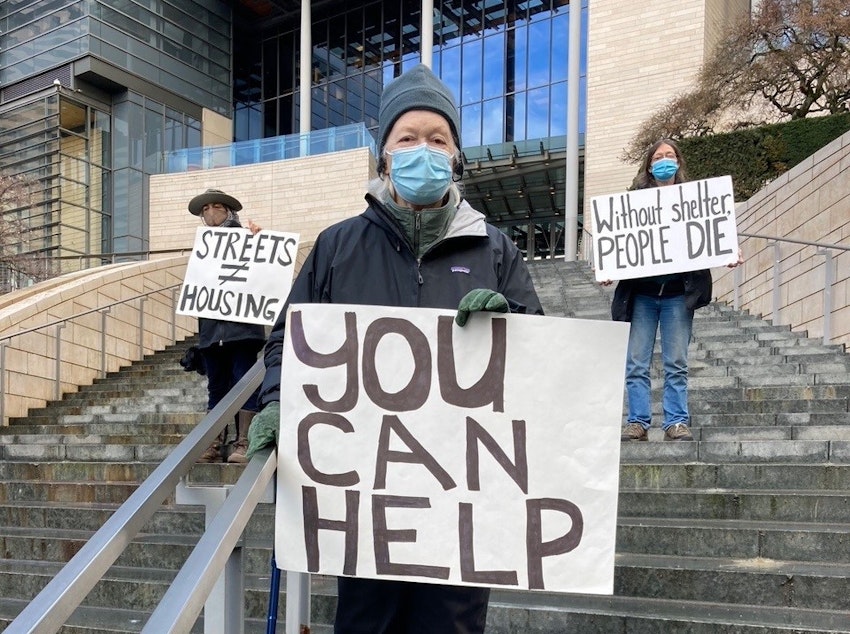
A prominent Seattle activist has died, following a long battle with cancer.
Jean Darsie advocated for world peace and sustainability.
But she’s best known as an advocate for people facing homelessness.
Jean Darsie believed that housing is a human right.
Jen Muzia, executive director of the Ballard Food Bank, says Darsie stood for the humanity of people who are unhoused.
"It always seemed like Jean came to the table with just this underlying belief that everyone’s a human being and they deserve shelter, that they deserve programs that are supporting them,” Muzia said.
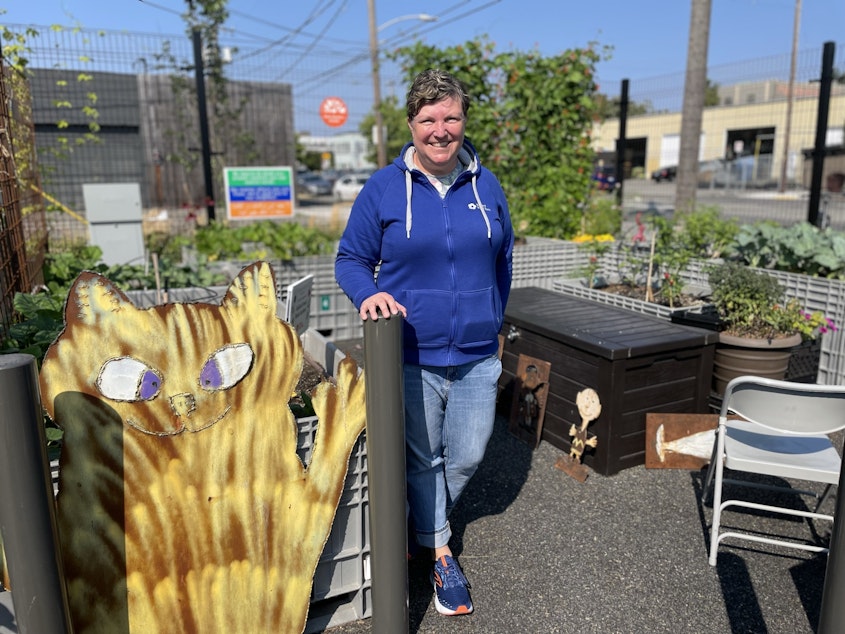
Darsie came into activism relatively late, according to Michele Marchand, an organizer with homeless advocacy organization Share/Wheel who often worked with Darsie on responses to homelessness.
Sponsored
"But when she came into the work, she really embraced it fully and made a huge impact with her quiet tenacity," Marchand said.
One program Jean Darsie co-founded with Bellevue Reverend Bill Kirlin-Hackett is the Vehicle Resident Outreach Program (formerly known as Scofflaw Mitigation Program). It aims to help people who live in their vehicles.
Jenn Adams was living in her van when she met Darsie.
“What she did mostly for me was mentor me a lot," Adams said. "It’s hard coming out of homelessness, and so I could always pick up the phone and ask her questions.”
Adams says Darsie did things like bring her a replacement tire, or look things up on the internet for her when her cell phone battery was dead and the library was closed.
Sponsored
When some administrative hurdle stood between Adams and the services she needed, Darsie would volunteer herself immediately.
"She'd say, 'Oh, well, let's do it,'" Adams recalled. Then she said Darsie would stay with her until the obstacle was eliminated.
Today, Adams has stable housing and a job working for the Vehicle Resident Outreach Program. She credits Darsie with her success.
"She was a big crutch," Adams said. "I looked at her like an aunt, or perhaps a second mom type of figure."
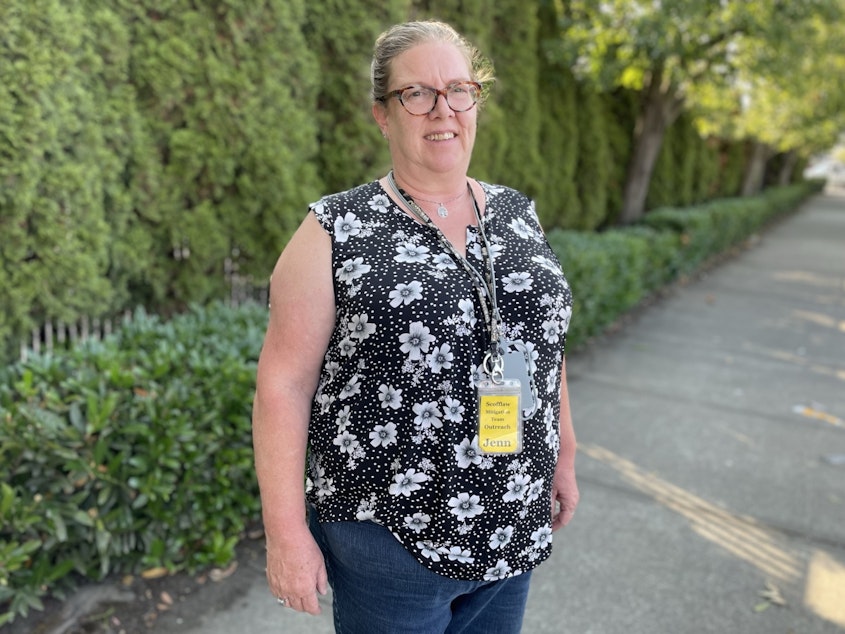
Sponsored
Darsie's generosity extended to many of her clients. For example, one time she sat for hours, watching a man's tent and belongings when he made an unplanned trip to the emergency room.
Focusing on people living in vehicles on city streets where they could get towed meant trying to find places for those vehicles to park safely, so the vehicle occupants could focus on getting their lives back together.
Sally Kinney, who was on the Ballard Community Taskforce on Homelessness and Hunger with Darsie, recalled visiting churches with her, hoping to find safe haven for those vehicles.
The pair of them drove around to Ballard churches one at a time. One by one, the churches all turned them down. The last church on the list was a small, conservative church where Kinney says they found the minister sitting in a small office near the front door.
Kinney says he listened to their case, then told them, "'Well, you seem trustworthy, so I'll tell you that I have let several homeless guys park their trucks on the lot at night. I haven't told my congregation because they'd say no. I couldn't let more people park there because they'd make me kick these guys out also."
Sponsored
"We looked at this nice man who had a tiny church, with probably a tiny congregation and a small lot, and almost cried," Kinney recalled. "We told him we'd keep the secret, thanked him for showing respect and love for people in need, and left. Eventually, only one Ballard congregation decided to allow vehicle residents on their lot."
Jean Darsie and the Reverend Kirlin-Hackett made sort of an odd team, Kirlin-Hackett recalls.
Darsie came from a technical background, and saw things through that lens. Problems were puzzles to be solved with efficiency and professionalism. Kirlin-Hackett says Darsie's ability to bring calm facts to heated conversations was one of her greatest gifts.
Kirlin-Hackett often spoke in religious terms. He says Darsie didn't hold the same religious views, but nonetheless found common ground with him. The two of them spoke at least every week from 2011 until she died.
Over years, the Vehicle Resident Outreach program they built, initially known as the Scofflaw Mitigation Program, went from outsider status to minor institution.
Sponsored
In 2013, it won the "Innovative Program" award from the Seattle Human Services Coalition.
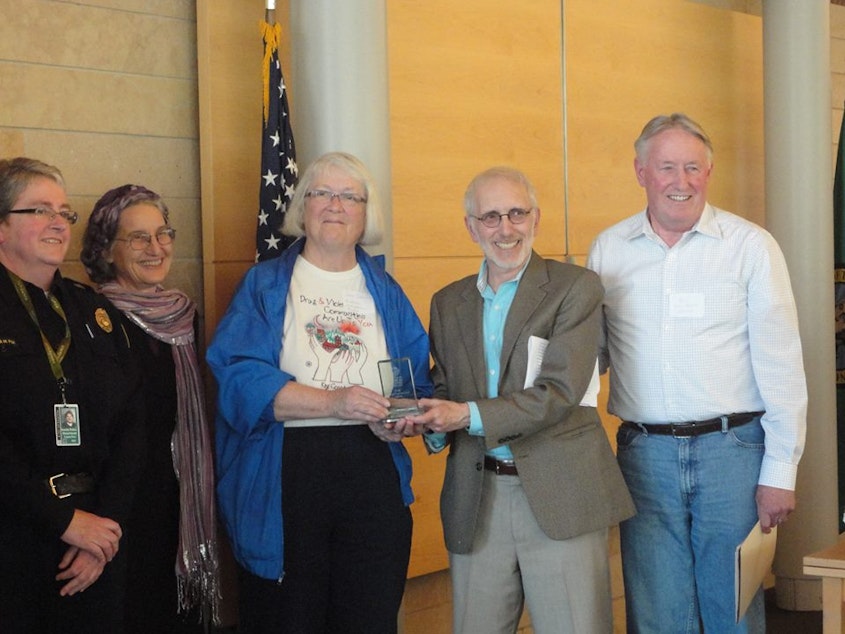
Despite this recognition, the program operated on nothing but donations and volunteer labor until just a couple years ago.
That's when, following a meeting with then-Seattle-mayor Jenny Durkan that didn't go very well, Darsie slipped through the door behind an exiting Durkan and cornered her in the hallway. There, Darsie calmly pleaded her case, according to Adams, who was also there at the time.
Something in Darsie's quiet words apparently convinced the mayor, and from that point, the program has had financial support from the city of Seattle.
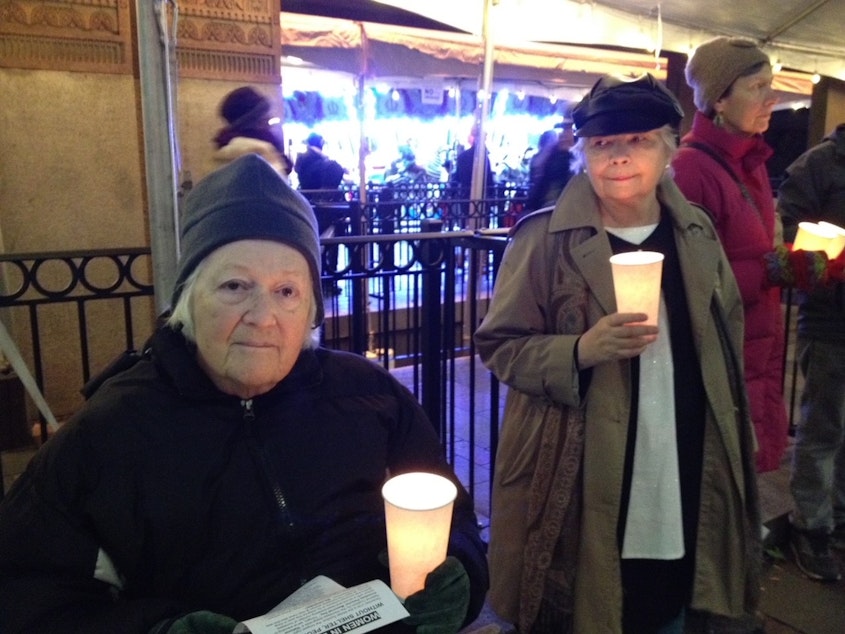
Jean Darsie's passing comes a few weeks after her close-knit community of activists lost another important figure, Dorli Rainey. Like Darsie, Rainey often stood silently as a member of the Women In Black. The group stood holding candles at public gatherings in remembrance of people lost to homelessness or war.
At the end of her life, as she lay in hospice, Darsie continued to focus on her clients living in vehicles, communicating with colleagues the next steps for each client as if she were about to go on a long trip, Adams says.
Kirlin-Hackett says he's still getting used to the idea that she's gone. At first, he says he thought it wouldn't affect him, in part because for all Darsie's warmth, she maintained a professionalism in all her interactions. But in the last few days, he says her loss has begun to weigh on him heavily.
"I probably haven't had the good cry yet that I need to have," he said.
As for the Vehicle Resident Outreach Program, Kirlin-Hackett says it will continue to serve people in the way Jean Darsie did: “Care for the people. Create stable places for them. Their vehicle is secondary to who they are.”


